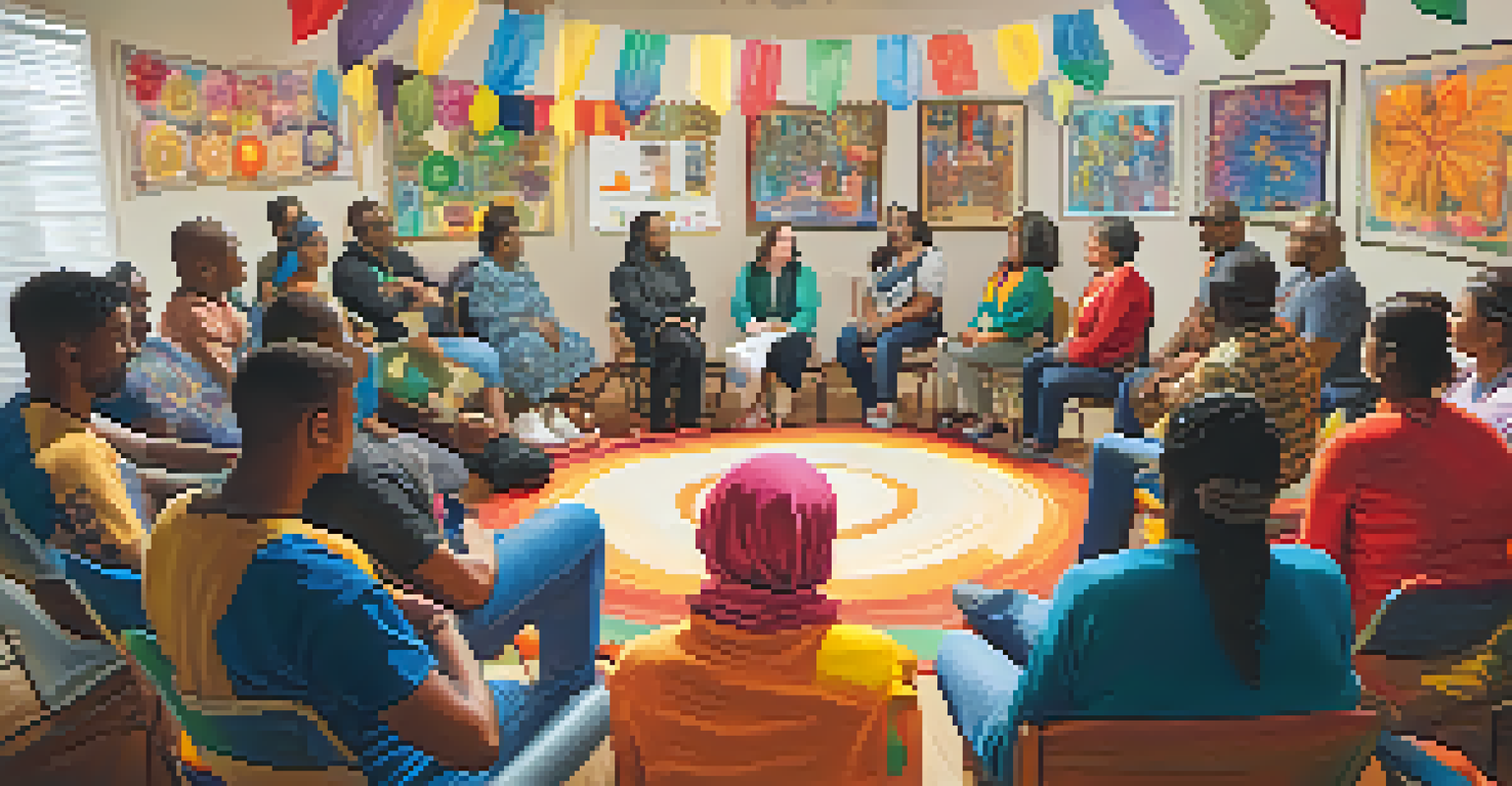The Importance of Cultural Competence in Addiction Interventions

Understanding Cultural Competence in Addiction Treatment
Cultural competence refers to the ability to understand, respect, and effectively interact with individuals from diverse cultural backgrounds. In the context of addiction interventions, it means recognizing how culture influences behaviors, beliefs, and responses to treatment. For instance, a person's cultural upbringing may affect their perception of addiction and their willingness to seek help.
Cultural competence is the ability to understand, communicate with, and effectively interact with people across cultures.
When practitioners are culturally competent, they can tailor their approaches to meet the unique needs of clients. This not only fosters trust but also encourages open communication, which is crucial for effective treatment. In essence, cultural competence is about bridging gaps between the treatment providers and clients to create a more inclusive environment.
Moreover, understanding cultural nuances can help in identifying specific barriers that clients may face during their recovery journey. For example, certain cultural beliefs may stigmatize seeking help for addiction, making it challenging for individuals to access necessary resources. By recognizing and addressing these issues, healthcare professionals can significantly enhance the effectiveness of their interventions.
The Impact of Culture on Addiction and Recovery
Culture shapes how individuals view addiction and the recovery process. For some, addiction may be seen as a moral failing, while others might view it as a medical issue needing treatment. These differences can significantly impact a person's willingness to participate in intervention programs and adhere to treatment plans.

Additionally, cultural practices and communal support systems can either facilitate or hinder recovery. For instance, in some communities, collective healing practices are preferred over individual therapy, which may be perceived as isolating. Understanding these cultural preferences is essential for designing interventions that resonate with clients and their support networks.
Cultural Competence Enhances Treatment
Understanding cultural backgrounds allows practitioners to tailor addiction interventions, fostering trust and effective communication.
By acknowledging the cultural dimensions of addiction, practitioners can create more effective and respectful treatment strategies. This means not only adapting therapy methods but also integrating cultural practices that promote healing, thereby enhancing the overall recovery experience for clients.
Building Trust Through Cultural Understanding
Trust is a cornerstone of successful addiction interventions, and cultural competence plays a significant role in building that trust. When practitioners demonstrate awareness and respect for a client's cultural background, it fosters a sense of safety and understanding. Clients are more likely to open up about their struggles when they feel that their cultural identity is acknowledged.
The most important thing in communication is hearing what isn't said.
For example, a therapist who understands the significance of family dynamics in certain cultures can better engage clients by involving their families in the treatment process. This collaborative approach not only strengthens the therapeutic alliance but also helps clients feel supported in their recovery journey.
Moreover, when clients see that their practitioners are genuinely invested in their cultural context, it encourages them to be more active participants in their treatment. This active engagement is vital as it can lead to better outcomes and a higher likelihood of sustained recovery.
Adapting Treatment Approaches for Diverse Populations
Culturally competent addiction interventions require adapting treatment approaches to meet the diverse needs of various populations. This might involve using culturally relevant materials, incorporating traditional healing practices, or considering language barriers. Practitioners must be flexible and willing to modify their methods to align with clients' cultural values.
For instance, utilizing community resources such as support groups that align with a client's cultural background can enhance engagement. These groups often provide a safe space for individuals to share their experiences and learn from others who understand their cultural context. This not only aids in recovery but also reinforces a sense of belonging.
Community Involvement Supports Recovery
Engaging family and community in the recovery process strengthens support networks and enhances client motivation.
Additionally, practitioners should continue educating themselves about the cultures they serve. Engaging in ongoing training about cultural awareness can help them stay informed about best practices and emerging trends in addiction treatment. This commitment to learning ensures that treatment remains relevant and effective for all clients.
Addressing Systemic Barriers in Addiction Treatment
Cultural competence in addiction interventions also involves recognizing and addressing systemic barriers that affect marginalized communities. Factors like socioeconomic status, access to healthcare, and discrimination can greatly impact an individual's ability to seek and receive treatment. Understanding these barriers is crucial for tailoring interventions that truly meet the needs of diverse populations.
For example, individuals from low-income backgrounds may face logistical challenges, such as transportation issues, which can hinder their ability to attend treatment sessions. By identifying these obstacles, practitioners can work to create solutions, such as providing remote therapy options or transportation assistance.
Furthermore, advocating for policy changes that support equitable access to addiction treatment is another essential aspect of cultural competence. This can involve collaborating with community organizations to ensure that resources are available and accessible to those who need them most. By addressing these systemic issues, we can create a more inclusive and effective addiction treatment landscape.
The Role of Family and Community in Recovery
Family and community play a pivotal role in the recovery process, particularly within certain cultural contexts. Many cultures emphasize the importance of collective support, where family members and community leaders are actively involved in the healing journey. This communal approach can provide individuals with a robust support network that is vital for lasting recovery.
Incorporating family dynamics into treatment plans can enhance a client's motivation and accountability. For example, involving family members in therapy sessions can help them understand the challenges of addiction and learn how to provide appropriate support. This not only empowers families but also reinforces the client's commitment to recovery.
Addressing Systemic Barriers is Crucial
Recognizing and addressing systemic challenges faced by marginalized communities improves access to addiction treatment.
Additionally, community engagement can offer resources and support that individuals might not find in traditional treatment settings. Community-based programs often provide culturally tailored interventions that resonate more deeply with clients. By leveraging the strengths of families and communities, practitioners can create a more holistic approach to addiction recovery.
The Future of Culturally Competent Addiction Interventions
As our society becomes increasingly diverse, the need for culturally competent addiction interventions will only grow. Future treatment models must prioritize cultural awareness and inclusivity to ensure that all individuals receive the support they need. This will involve ongoing education, training, and adaptation of practices to meet the evolving needs of diverse populations.
Emerging technologies, such as telehealth, also present new opportunities for enhancing cultural competence in addiction treatment. These platforms can connect clients with culturally aligned practitioners regardless of geographic barriers, thus expanding access to care. As technology evolves, so too can our approach to providing culturally sensitive interventions.

Ultimately, prioritizing cultural competence in addiction interventions is not just an ethical imperative—it's a pathway to more effective treatment outcomes. By committing to understanding and respecting the diverse backgrounds of clients, we can foster a more inclusive and supportive environment for recovery that benefits everyone involved.